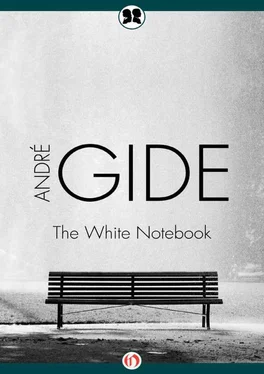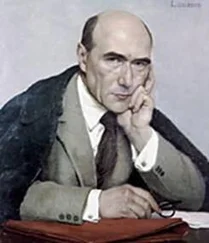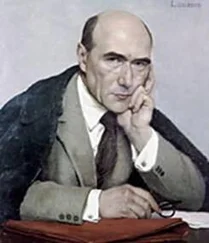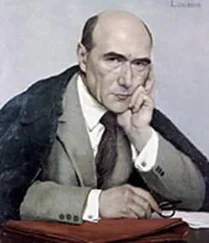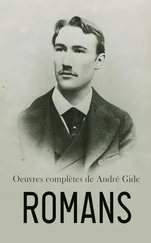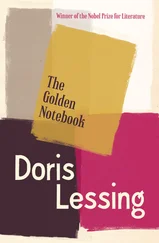“Reason will ridicule but, in spite of all philosophical objections, the heart will always need to believe.” 36
“ΣYMΠAθEIN — to suffer together, to vibrate together. Imagination is all powerful, even in matters of the heart. Charity depends on our ability to imagine the griefs of others and make them our own. Thus is the life of the soul multiplied. And thus does compassion assuage grief.
“A heart vibrating to the emotions of all men, throughout time and space, and doing so voluntarily though spontaneously: that is what we need.”
We used to read aloud on autumn evenings when they had assembled between the hearth and the lamp. Thus we read Hoffmann and Turgenev.
Everyone listened, but the modulations in my voice were for you alone. I read to you over their heads.
We studied German together, though we already knew the language. The lessons were a pretext for leaning over the same book and being excited by the discovery of subtleties of meaning as we translated passages.
That is how we became acquainted with Die Braut von Messian, Die Heimkehr, and Die Nordsee.
German has whispered alliterations which make it a better medium than French for expressing vague yearnings.
One evening it was raining and those who had gathered there had been talking for a long time.
“André,” said V***, “will you read a little?”
I began the Expiation, which she did not know. It is indeed a soothing work. Reading the words with subtle inflections, I made the violent emotions that were flooding my soul flow into yours. ΣYMΠAθEIN: to experience together violent emotions. 37
I did not see you. You were sitting in the shadow, but I felt your look when I read:
And their soul sang in the brass bugle.
The sun was setting. Evening shadows were invading the room. No longer able to see clearly enough to read, I closed the book and recited:
Not one retreated. Sleep, heroic dead! …
When the lamp was brought in for us, it seemed to awaken us from a dream.…
“Listen,” I said to you. “Pay close attention to what I am saying.”
I wanted to go over a difficult problem concerning German metaphysics that had bothered me for a long time. I saw that the attempt to follow my reasoning was causing wrinkles to mar your brow, but the obstacles that I had already cleared goaded me onward, and I continued to speak. I would have liked for our minds to travel together along every byway; I suffered when learning without you; I needed to feel your presence; I thrilled to your emotions more than to my own. But these heights were too lofty; your spirit fluttered helplessly and grew tired.
I suffered much over such things. When you were not there and overpowering emotion forced me to speak, my mother soon tired of my expositions, for she lacked your benevolent patience. When she became listless, I fell silent and my rebuffed soul shivered in its solitude.
I was then a child. I did not understand that the mind is nothing and passes away while the soul still remains after death.
The mind changes, grows feeble, passes away; the soul remains.
“What is the SOUL?” they will ask.
The SOUL is our WILL TO LOVE.
We still said “brother” and “sister,” but with a smile. Our hearts were no longer deluded. Yet you wanted to be deluded. You were afraid that we would go too far, and you hoped that you could allay your incipient fears by using a familiar word as a decoy. You thought perhaps that the word would evoke the thing and that if we always called each other brother and sister, our relationship would be fraternal. But in spite of our intentions, alien inflections marked our words; they became more intimate, more endearing, more mystical when whispered to each other. When you said “my brother” and I answered “little sister,” our hearts quivered at the involuntary tenderness of our voices. 38
Long autumn days … sitting by the fireside while rain fell outside … engrossed in reading for hours at a time … and you sometimes came to lean over my shoulder and read.
I was reading The Golden Ass when you came, as was your custom, to read over my shoulder.
“This is not for you, little sister,” I said as I pushed you away from me.
“Then why are you reading it?”
You smiled somewhat waggishly — and I closed the book.
Playing games during our childhood, seeing landscapes, conversing at length, reading together when we knew nothing and could discover everything together.…
All these things mean nothing to others but gradually shaped us and made us so nearly identical.…
A stranger, Emmanuèle?…
Would a stranger remember the beloved dead?
Oh that he had never known them! Oh that he had never seen their smiles! When you chose to speak of them, he would not understand. Then you would fall silent, aware of your loneliness.
( incomplete )
I no longer know either where or when: It was in a dream.
One night I was weeping for both of us — and your dear shadow came close to me. I felt your hand on my brow and saw your sweet smile.
But I was still weeping.
“Well, do you want to, André?…” you asked without moving your lips. Your smile illuminated my soul.
In my soul I have kept the music of your words, and on my brow the memory of your sweet caress.
28 May
The last three days I have reread your letters. I have kept them all, but they give a poor impression of you. If they were all I had to remember you by, I would think you waggish, rather fickle, always evasive and elusive. Your mind forces your soul to remain aloof. 39
From time to time, however, it would suddenly cry out to me, and it was then so plaintive — like a prisoner.
“Do not withhold your affection, my brother,” you said. “I prefer it above all else.”
And later on, after a separation, you said: “I can not accept the idea of life without you.”
And there was still more. There were fleeting moments of tenderness, quickly squelched by the mind; then in the next letter, ironically you made fun of yourself and of me for having believed you.
The reason was that far from me, your mind was again dominating your soul.
Yes, sometimes your soul managed to break free, and when it spoke, its ardor astounded even me. At times I questioned your tenderness since you refused to acknowledge it to yourself; I thought that I loved you much more.
The last night before we were to part for a long time, I told you these things and wept — as much from emotion as from the wish to be assured by you — for I was comforted by only the most tenuous hope, and when I was uncertain your absence made me fear the worst. But you finally tired of the silence.
“Oh, André,” you exclaimed tearfully, “never will you know how much I loved you!”
Your mind is stubborn, despotic. It would have you be domineering. You again resorted to mockery. O the smirk on your lips! I had to obey immediately or you would evade me. Silence until I gave in. You knew that I would always come back to you. That was what made you strong; I was not sure of you; I gave up quickly.
Then came sweet reconciliation. We managed to be together more often, and our souls were all the more loving when we were apart because we had restrained them.
Your mind! I will find fault with it because it irritates me. It is your mind that I know best, and yet it is not similar in any respect to my own. You are afraid to admire without passing judgment. You would like to keep your reason unimpaired; whatever is immoderate terrifies you — as much as it attracts me. I resent your not having trembled in the face of Luther’s grandeur; then I sensed your femininity, and I suffered. You understand things too well and do not love them enough.
Читать дальше
